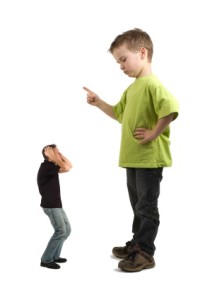
Forget for a moment that this example is about a child and their parent. Instead, imagine we are speaking about two children at school. When child #1 says “no” to child #2, this leads child #2 to begin calling them names, threatening them, and may even assault them. At some point, child #1 may relent and give in to child #2 out of fear for their own safety.
What would we call this? It certainly can’t be categorized as a “win” for this friendship. Now imagine the same scenario, this time between two adults who are involved in a romantic relationship. We all recognize the inherent danger in such a relationship and recognize it as wrong. So why don’t we condemn such behavior when it is displayed by one’s own child? A bully by any other name is just that. The dynamic that is playing out is synonymous with how bullying is often defined. According to Merriam-Webster, a bully is defined as “to cause (someone) to do something by making threats or insults or by using force”. But is this really possible? Could your child really be bullying you?
According to many parenting experts, the answer to this question is an emphatic “yes”. In Sean Grover’s book, “When Kids Call The Shots: How to Seize Control from Your Darling Bully — and Enjoy Being a Parent Again” Grover discusses this phenomenon, its root, and how to stop such behavior from negatively impacting your household.
Grover first notes that the way by which someone parents their child, is most influenced by the way they themselves were parented. People who were bullied by their own parents may fear doing this to their own children, thus leading them to become too liberal with their kids – unwilling to make firm rules for fear of being viewed as bullies themselves. Alternatively, parents who were raised by absentee or neglectful parents may not have a sufficient internalized model of what “good” parenting is. As a result, they may defer to their spouse or their child when a parenting decision is needed. This in turn sends the message that they aren’t the ones in the family with the power to make decisions, leading many children to step-up to that role. While these are understandable reactions to traumatic childhoods, they can end up causing both the parent and child more difficulties than they solve.
To correct this dynamic, Grover suggests recognizing that bullying ” is a symptom of an unbalanced inner life”. In other words, something in your child’s life might be upsetting them, which leads them to act out towards their parent who they know will love and support them no matter what. However, this doesn’t mean that a parent should allow this bullying interaction to continue, or else it could have a negative impact on all of your child’s future relationships. Instead, Grover recommends parents identify what is really going on in the child’s life that is leading them to act out in this way. If a parent can identify the source of frustration or anxiety, they may be able to help their child correct it.
The next step is to not be reactive in heated moments. Remember that you don’t have to attend every argument that you are invited to, and that modeling how you want your child to handle stress will have the greatest impact on how they deal with future difficulties. Grover is quoted as saying that “children absorb 10% of what you say, and 90% of what you do”. If you become frustrated yourself and begin yelling or threaten punishments (to your children or spouse), you will only be guaranteeing that at some point, you’ll be on the receiving end of similar behaviors from your children. It might not seem worth the hassle to correct now while they are young, but remember: they will eventually get older, stronger, and be able to do more damage. It might be worth it to focus on this issue now before it becomes harder to change.
Finally Grover notes the importance of being united in parenting with your partner. Conflicting or inconsistent parenting styles are frequently at the root of many behavioral problems in children. Getting on the same-page with anyone you might co-parent with is integral to ensuring that bullying behavior does not continue. And if you find that the behavior is an ongoing issue, don’t be afraid to enlist the assistance of community resources such as therapists, parenting classes, or friends who have been through similar experiences.
